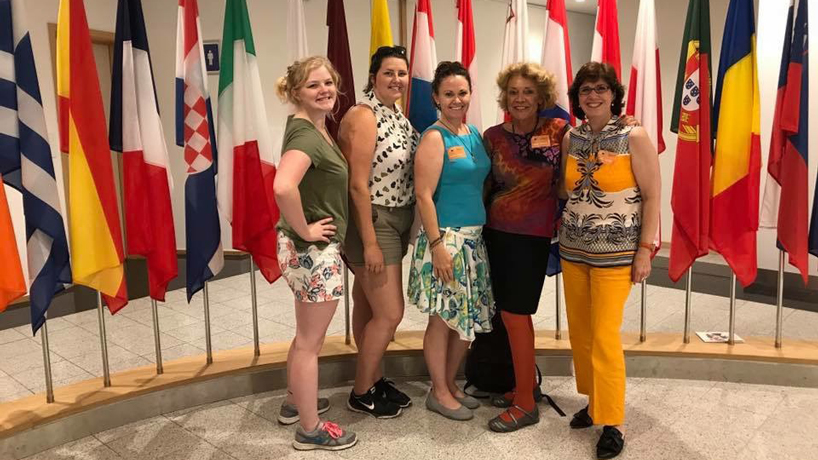
Psychology alumna Savannah Price (second from left) used summer 2017 study abroad trips led by UMSL faculty members Bettina Casad (middle) and Joyce Mushaben (second from right) to inform a research proposal on attitudes toward immigrants in the European Union that earned a Mamie Phipps Clark grant from the Psi Chi international psychology honor society. (Photos courtesy of Savannah Price)
After two years playing softball and going to school at Fort Hays State University in Hays, Kansas, Savannah Price was ready for a change.
The St. Charles County native was looking to continue her undergraduate education closer to home. She “just kind of happened” to pick the University of Missouri–St. Louis, and during her first semester on campus, she took two classes with Assistant Professor of Psychology Bettina Casad: “Social Psychology” and “Stereotyping, Prejudice and Discrimination.”
Price was hooked.
“I realized how amazing UMSL’s psychology program was,” said Price, who graduated with her BS in psychology in May. “I pretty much just got lucky that I picked UMSL.”
Price made herself a competitive candidate for graduate schools by spending more than a year working in Casad’s lab. She also expanded on her UMSL experience by participating in two short-term study abroad programs in the summer of 2017: “Psychology of Intergroup Relations” with Casad in Italy and “Gender in the European Union” with Curators’ Professor of Comparative Politics & Gender Policies Joyce Mushaben in Belgium and Germany.
This past spring, Price earned a Mamie Phipps Clark grant from the Psi Chi international psychology honor society for research focusing on diverse populations and issues. The funding is going toward a project she, Casad and UMSL senior Drake Anderson are pursuing about anti-immigrant attitudes among people living in the EU.
“Experiencing the culture firsthand, getting exposed to current political issues in the country, it kind of brought the textbook to life for Savannah,” Casad said. “Making those connections outside of the classroom is really what sparks the passion to investigate something more.”
In the span of two weeks, Casad’s trip took Price all over Italy, from Venice in the northeast corner to Naples about 450 miles to the southwest. With Mushaben in Brussels, Price sat in on an EU Council discussion about the influx of immigrants faced by the continent since 2015.
They were both eye-opening experiences.
“It was interesting to see how the economic crisis was still affecting Italy,” Price said. “There has been just a huge amount of immigration coming to these small Mediterranean countries that can’t necessarily handle it because they’re not economically strong. Dr. Casad helped me pick the countries I was going to focus on, then it was up to me to go out and look at potential things that could affect attitudes toward immigrants and their outlook on their future economically.”
Price, Casad and Anderson are researching feelings toward immigrants in Greece, Italy and Spain, as well as the underlying causes of these sentiments. Price is also delving deeper into how religion informs viewpoints in Spain and Italy.
Both are majority Catholic countries, but Italians are more devout on the whole. The study seeks to show whether increased religiosity corresponds with increased anti-immigrant sentiment, as most of the new immigrants to Europe are coming from majority Muslim countries.
The researchers are also testing the hypothesis that the more people identify with their individual countries, rather than Europe as a whole, the more likely they will be to harbor anti-immigrant attitudes.

Savannah Price spent more than a year working in Bettina Casad’s lab at UMSL, which helped bolster her resume for graduate school.
“What we’re trying to show is the anti-immigration sentiment that’s become more popular in Europe, compared to a few years ago, is really motivated by intergroup threat,” Casad said. “There’s an economic aspect, but then there’s the symbolic threat where immigrants have a different religion, speak a different language, have a different culture, are not going to fit in. So it’s really the psychological intergroup threat that’s motivating anti-immigration sentiment, more than it being economic.”
Price, Casad and Anderson are gathering questionnaire responses from the three countries and analyzing the data, with an eye toward presenting the findings in the spring.
In the meantime, Price has also been busy starting her graduate program in industrial/organizational psychology at Southern Illinois University Edwardsville. She said her time working with Casad was pivotal in readying her for the next step.
“It prepared me for reading research articles because we would do lit reviews all the time,” Price said. “Also, being able to get the experience applying for grants because now those are things I have to do as projects in class and things I have to do to present in conferences on my own. I consider myself very lucky to have been in her lab and able to get those little experiences.”
Her graduate school research is focused on women and pay negotiations in the workplace. Soon, she’ll also be a published author of the UMSL immigration study and well on her way to a diverse start to her career in psychology.
“Her path is a good one to role model: get involved with undergraduate research as early as possible, start to get involved in a research lab, then take advantage of opportunities like study abroad to internationalize the experience you have in the classroom,” Casad said. “Ultimately, that makes you more competitive for graduate school. She shows that path of really getting out of the classroom and being more than a good student: getting involved in research, doing study abroad, collecting data, doing an independent project and then, ultimately, going on to grad school.”














